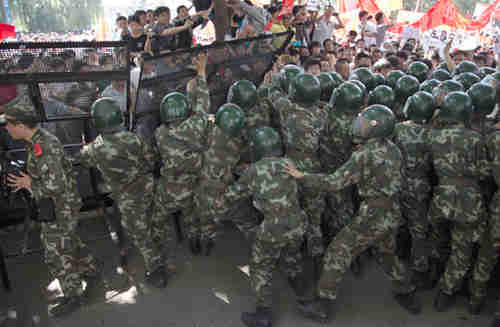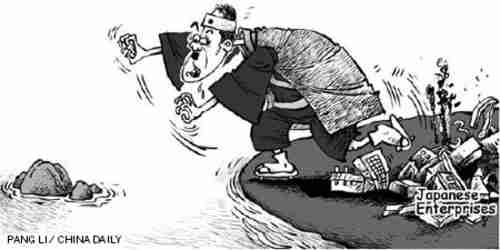"The "nationalization" of the Diaoyu Islands by Japan
after "purchasing" them from a "private owner" is ridiculous and
cannot change the fact that they are Chinese territory. ... China
should take strong countermeasures, especially economic sanctions,
to respond to Japan's provocations. Military consideration,
however, should be the last choice.
The United States has frequently used Article XXI Security
Exceptions of the WTO (taken from the earlier General Agreement on
Tariffs and Trade) to impose economic sanctions on other
countries. The security exception clause says a country cannot be
stopped from taking any action it considers necessary to protect
its security interests. That means a country can impose sanctions
on enterprises, financial institutions, organizations and even
other countries' central and local governments. Taking a cue from
the US' practice, China can use the security exception clause to
reduce the export of some important materials to Japan.
China didn't announce any sanctions against the Philippines in
April, but it froze banana imports from that country in response
to Manila's aggressive attitude in the Huangyan Island
dispute. Though the economic countermeasure forced the Philippines
on the back foot, it also harmed the interests of some Chinese
enterprises.
So it is important for China to devise a sanction plan against
Japan that would cause minimum loss to Chinese enterprises.
The US' capability to impose economic sanctions on other countries
is based on its economic strength, huge share in global trade,
financial institutions and global intelligence network. China,
too, has the capability to impose sanctions on other countries now
that it is the second largest economy, has the largest foreign
reserves, and is the largest exporter and second largest importer.
An analysis of Sino-Japanese economic interdependence shows that
Japan's economy will suffer severely if China were to impose
sanctions on it. China's loss would be relatively less. ...
So it's clear that China can deal a heavy blow to the Japanese
economy without hurting itself too much by resorting to sanctions.
Apart from its reliance on China, Japan has been suffering from
other economic ills. First, Japan's massive government debt is
increasing substantially. ... Third, Japan's fiscal deterioration
is likely to continue. There are enough indications that Japan's
economic growth in 2013 will slow down or slip into another
recession. The irreversible trend of long-term economic downturn,
combined with Japan's aging population, will eat into the
country's household savings, and the declining purchasing power of
the Japanese will increase Japan's fiscal debt. ...
But instead of blindly boycotting Japanese goods, China should
work out a comprehensive plan which should include imposition of
sanctions and taking precautionary measures against any Japanese
retaliation. China should also have several rounds of policies
ready to undermine the Japanese economy at the least cost of
Chinese enterprises.
Furthermore, in case Chinese enterprises suffer because of the
sanctions, the Chinese government should be prepared to compensate
them. And once China imposes sanctions on Japan, the government
should ensure that all enterprises in the country, domestic and
foreign, obey the rules."























